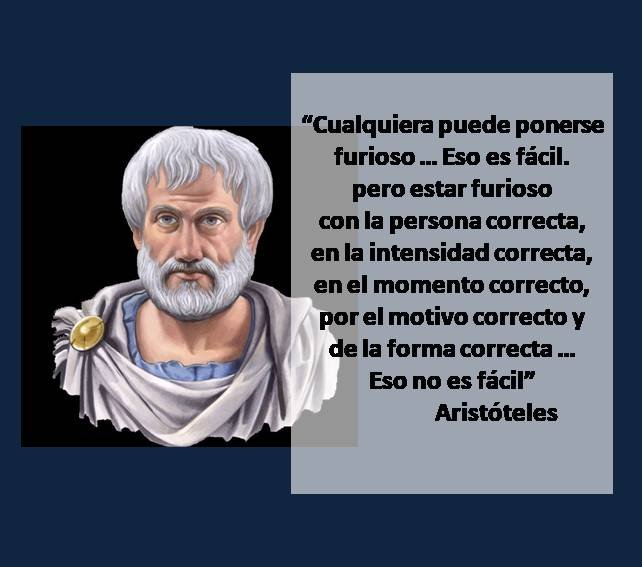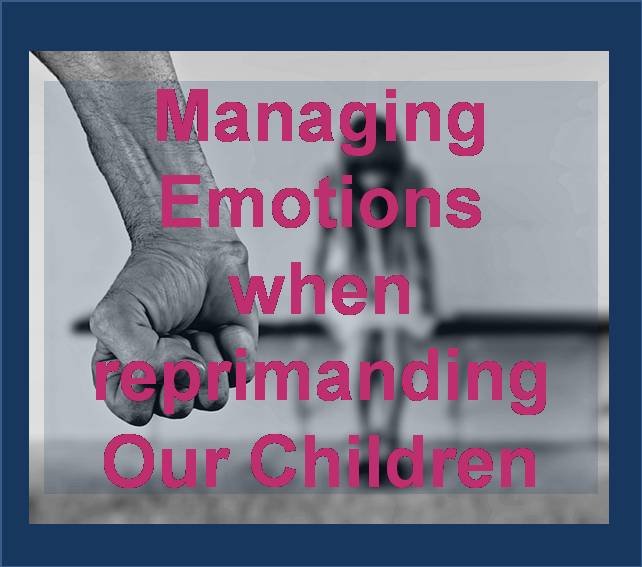Manejar las Emociones al Reprender a Nuestros Niños//Emotional Management When we Reprimand [ESP-ING]


Victoria tiene 11 años y se le dificulta mantener en orden sus espacios y los espacios comunes dentro del hogar. Su mamá, Marta, con cierta frecuencia e insistencia va detrás de ella recordándole lo que tiene que hacer: Victoria recoge tu cuarto, Victoria recoge los zapatos que dejaste en la sala, Victoria ven a fregar lo que dejaste en el fregador que yo había recogido la cocina, Victoria…, la lista es interminable y agotadora.
Una tarde Marta llega del trabajo cansada y de mal humor por un percance que tuvo con un cliente. Al entrar al apartamento lo primero que ve son unos cuadernos y demás útiles escolares regados sobre la mesa del comedor, también ve un vaso con restos de alguna bebida y un par de chancletas a los pies de una silla vacía. En ese momento Victoria sale con una sonrisa a recibir a mamá, Marta, iracunda se acerca a ella la agarra por una oreja y templándola la lleva hasta la mesa, con voz que casi llega al grito, agria y fría le dice:
—Hasta cuando te tengo que decir que dejes este desorden, eres tan cochina y desordenada que ya ni me provoca llegar a la casa, ¡Sola debería dejarte! para que vivas tranquila en tu chiquero, que es lo que te gusta, eres tan desconsiderada… y por allí sigue el desahogo de mamá.
Aquí entra perfectamente esta frase aristotélica sobre la dificultad que podemos tener al canalizar nuestras emociones y a la vez nos sirve de guía para tener una comunicación asertiva que nos lleve a obtener mejores resultados en nuestra relación con los hijos. Veamos algunos aspectos:

Cualquiera puede ponerse furioso
Comencemos con la afirmación “Cualquiera puede ponerse furioso” ciertamente la ira es una emoción que todos en algún momento hemos sentido, la reconocemos con cierta facilidad porque nos “enciende” por dentro y, cuando explota, dependiendo de su intensidad, nubla el entendimiento no atendiendo razones, nos sentimos atacados y podemos decir palabras que buscan herir al que consideramos nuestro atacante, cuando esto sucede con las personas que amamos, inevitablemente, la relación se deteriora, abrimos brechas que nos van separando y que luego son difíciles de cerrar.
En el caso de Marta, efectivamente hay unas acciones y actitudes en la niña que pueden resultar molestas para la convivencia, en este momento no vamos ahondar en ello, sino en el hecho que mamá ha venido acumulando, conteniendo una serie de hechos que en algún momento tenían que salir, lo que nos lleva a la segunda idea:
Estar furioso con la persona correcta

Marta llega de la calle molesta por la situación que se le presentó con el cliente y por razones laborables, no pudo decirle a esa persona sus “cuatro verdades”, lo que la llena de impotencia y frustración. Al entrar al hogar y encontrarse con lo que ella considera un “espectáculo dantesco” vuelca su ira en la niña, es decir, la persona menos indicada y que no tiene nada que ver con su problema no resuelto.
Muchas veces los padres desahogamos nuestra ira y frustraciones con los hijos, nos valemos de su debilidad, vulnerabilidad y poca capacidad de respuesta ante el adulto que es su papá/su mamá, este hecho recibe el nombre genérico de maltrato infantil, el cual, como todos sabemos, acarrea consecuencias negativas para la personalidad de nuestros tesoros. Analicemos un tercer punto:
La forma correcta
¿Existe la forma correcta? Sí, si existe, claro que como señala Aristóteles, no es fácil, requiere de dos elementos básicos: tomar conciencia y practicar. Vamos a verlo con el caso de Marta. Marta “aprovecha” su malestar para recriminarle a Victoria su conducta, por supuesto no fue el momento correcto y mucho menos con la intensidad correcta. Hay una regla que es bueno tener en cuenta a la hora de expresar nuestros sentimientos de malestar: “Exprésate desde tu sentir, atiende el hecho y no a la persona”.
Marta, en ningún momento dice cómo se siente, sino que arremete contra el ser de su hija, la descalifica colocándole etiquetas que pueden resultar ofensivas y que solo refuerza una conducta no deseada, adicional a ello la hace responsable de su malestar y toma una actitud de víctima creando en la niña un sentimiento de culpa y por si fuese poco la amenaza con el abandono, sin contar que también hubo agresión física.
No se trata de juzgar a Marta, pero definitivamente requiere de ayuda para aprender a manejar sus emociones:
Yo le daría, a modo de tips, estas recomendaciones:

1.- Respira, respira conscientemente tantas veces como sea necesario para calmarte antes de llegar a tu casa.
2.- Reconoce tu emoción en ese momento. Estas súper molesta con esa persona desconocida que permitiste que te amargara el rato, te llena de rabia lo que hiciste o dejaste de hacer, pero es con esa persona y contigo misma nadie distinto a ustedes dos tiene que “pagar” las consecuencias, por lo tanto el momento de calmarte es ahora, antes de entrar a tu hogar. Calmar no significa que no sientas ni que escondas tu malestar, se trata de entender que ese sentimiento no se lo puedo tirar encima a quién no le corresponde.
3.- Estas molesta y como humana es mentira que puedes bajar el Switche y entrar en tu casa como si vinieses de Disney. Pues reconócelo ante ti y ante los demás. Aplica la técnica del semáforo:
Rojo: detente, respira, cálmate, estas en pausa, no digas nada.
Amarillo: relaja, identifica lo que te molesta, ten claridad en lo que quieres expresar.
Verde: di lo que tienes que decir de la manera más calmada y exacta posible, que describan tu estado de ánimo y lo que deseas en ese momento, no tiene que ser con voz dulce, que difícilmente te va a salir, puede ser firme, clara y contundente que no quede lugar a dudas de tu intención, por ejemplo ante el desorden que ha dejado Victoria, llámala y dile:
—Por favor, recoge inmediatamente tu perolero, que no quede nada… estoy bien molesta por un problema que tuve con un cliente y no quiero pagarla contigo, así que por favor, recoge ya.
Lo más probable es que Victoria te entienda y se solidarice contigo, recogiendo todo y quizás su empatía llegue al punto de preguntarte si quieres algo o te pida que le cuentes que pasó y puedas desahogar, en alguna medida, la pena que te aflige.
La inteligencia emocional nos habla de la comunicación asertiva, aquella donde expresamos nuestras valoraciones sin descalificar y evitando los enfrentamientos, también nos habla del autocontrol emocional. Como adultos y formadores de familia es conveniente que busquemos las herramientas y estrategias que podamos para hacer de nuestro espacio vital, el hogar, un lugar donde sus integrantes puedan fortalecerse en todos los aspectos de su vida.

In English


Victoria is 11 years old and finds it difficult to keep her spaces and the common spaces in the home in order. Her mother, Marta, frequently and insistently goes after her reminding her of what she has to do: Victoria pick up your room, Victoria pick up the shoes you left in the living room, Victoria come and wash what you left in the sink that I had picked up in the kitchen, Victoria..., the list is endless and exhausting.
One afternoon Marta comes home from work tired and in a bad mood because of a mishap she had with a client. When she enters the apartment the first thing she sees are some notebooks and other school supplies scattered on the dining room table, she also sees a glass with some leftover drinks and a pair of flip-flops at the foot of an empty chair. At that moment Victoria comes out with a smile to greet mom, Marta, irate, approaches her, grabs her by the ear and takes her to the table, with a voice that almost reaches the scream, bitter and cold, she says to her:
-Till when do I have to tell you to leave this mess, you are so filthy and disorderly that you no longer even provoke me to come to the house, I should leave you alone! so that you can live quietly in your pigsty, which is what you like, you are so inconsiderate... and that's where mom's venting continues.
Here enters perfectly this Aristotelian phrase about the difficulty that we can have when channeling our emotions and at the same time it serves us as a guide to have an assertive communication that leads us to obtain better results in our relationship with our children. Let's look at some aspects:

Anyone can get angry
Let's start with the statement "Anyone can get angry" certainly anger is an emotion that we have all felt at some point, we recognize it with some ease because it "turns us on" inside and, when it explodes, depending on its intensity, it clouds the understanding not paying attention to reasons, we feel attacked and we can say words that seek to hurt the one we consider our attacker, when this happens with the people we love, inevitably, the relationship deteriorates, we open gaps that separate us and then are difficult to close.
In the case of Marta, there are indeed some actions and attitudes in the girl that can be annoying for the coexistence, at this moment we are not going to delve into it, but in the fact that mom has been accumulating, containing a series of facts that at some point had to come out, which leads us to the second idea:
Being furious with the right person

Marta arrives from the street upset about the situation that arose with the client and for work reasons, she could not tell that person her "four truths", which fills her with impotence and frustration. Upon entering the home and finding what she considers a "Dantesque spectacle" she turns her anger on the girl, that is, the least indicated person and who has nothing to do with her unresolved problem.
Many times we parents vent our anger and frustrations on our children, we take advantage of their weakness, vulnerability and low capacity of response before the adult who is their father/mother, this fact receives the generic name of child abuse, which, as we all know, entails negative consequences for the personality of our treasures. Let us analyze a third point:
The right way
Is there such a thing as the right way? Yes, there is, of course, as Aristotle points out, it is not easy, it requires two basic elements: awareness and practice. Let's see it with the case of Marta. Marta "takes advantage" of her discomfort to reproach Victoria for her behavior, of course it was not the right moment and much less with the right intensity. There is a rule that is good to keep in mind when expressing our feelings of discomfort: "Express yourself from your feelings, pay attention to the fact and not to the person".
Marta, at no time says how she feels, but rather lashes out against her daughter's being, disqualifies her by placing labels that may be offensive and that only reinforces unwanted behavior, in addition to this makes her responsible for her discomfort and takes an attitude of victim creating in the girl a feeling of guilt and as if that were not enough threatens her with abandonment, not to mention that there was also physical aggression.
It is not about judging Marta, but she definitely needs help to learn to manage her emotions:
I would give her these recommendations as tips:

1.- Breathe, breathe consciously as many times as necessary to calm down before you get home.
2.- Recognize your emotion at that moment. You are super upset with that unknown person that you allowed to embitter your time, it fills you with rage what you did or did not do, but it is with that person and with yourself, no one other than you two have to "pay" the consequences, so the time to calm down is now, before entering your home. Calm down does not mean that you do not feel or hide your discomfort, it is about understanding that I can not throw that feeling on who does not belong.
You are upset and as a human it is a lie that you can lower the Switche and enter your home as if you came from Disney. Well, admit it to yourself and to others. Apply the traffic light technique:
Red: stop, breathe, calm down, pause, don't say anything.
Yellow: relax, identify what bothers you, be clear about what you want to express.
Green: say what you have to say in the calmest and most accurate way possible, describing your mood and what you want at that moment, it does not have to be in a sweet voice, which will hardly come out, it can be firm, clear and forceful so that there is no doubt about your intention, for example in front of the mess that Victoria has left, call her and tell her:
-Please, immediately pick up your perolero, that there is nothing left... I am very upset about a problem I had with a client and I don't want to take it out on you, so please, pick it up now.
Most likely Victoria will understand and sympathize with you, picking up everything and perhaps her empathy will reach the point of asking you if you want something or ask you to tell her what happened and you can relieve, to some extent, the pain that afflicts you.
Emotional intelligence talks about assertive communication, where we express our values without disqualifying and avoiding confrontations, it also talks about emotional self-control. As adults and family educators it is convenient that we look for the tools and strategies we can to make our vital space, the home, a place where its members can be strengthened in all aspects of their lives.

Translated with www.DeepL.com/Translator (free version)
Fuente de imágenes: Portada - 1 -2 - 3 - 4



MIS REDES SOCIALES






Te invito a apoyar este proyecto como witnes y a formar parte de esta gran comunidad uniéndote a su Discord en el siguiente enlace:
Discord de la comunidad Cervantes




https://twitter.com/damaryspacheco5/status/1462875323863871493
The rewards earned on this comment will go directly to the person sharing the post on Twitter as long as they are registered with @poshtoken. Sign up at https://hiveposh.com.
Buen ejercicio de inteligencia emocional. Es posible que algún momento todos hayamos cometido este error de reprender cuando hemos sido afectados por alguna emoción fuerte fuera del hogar, incluso dentro de la misma casa podemos agarrar rabietas con uno y pagarla con otro. Cuesta actuar de manera correcta en la vida querida amiga pero ciertamente debemos aprender. Gracias por este nutrido tema.
Amiga uno de los mejores blog que he leído hasta ahora, tanto me gusto que sera el primero que reblogueo para no perderlo, muy claro y conciso, excelente trabajo, te seguiré de ahora en adelante saludos.
Gracias por tu apreciación @leanpoqui, tu comentario me llena de gran satisfacción 😊 Gracias por pasar, comentar, rebloguear y seguirme.